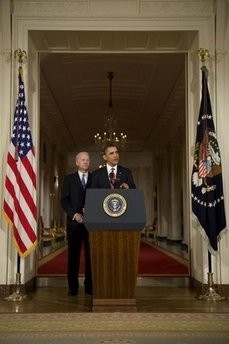
WASHINGTON (AFP) – The US Congress passed an historic health care overhaul, handing President Barack Obama a landmark win and taking the United States closer than ever to guaranteed coverage for all Americans.
The Democratic-held House of Representatives voted 219-212 to approve a Senate-passed bill aimed at extending coverage to 32 million Americans who currently lack it in the most sweeping social policy shift in four decades.
"Tonight we answered the call of history as so many Americans have before us. We did not avoid our responsibility we embraced it. We did not fear our future, we shaped it," Obama said in brief remarks shortly after the vote.
The president, who was expected to sign the bill into law within days, praised lawmakers for defying the predictions of pundits that the mammoth bill must collapse in the face of political setbacks and unyielding partisan rifts. Related article: History of US health care reform battle
Tired after a week in which he met or spoke to nearly 100 lawmakers, but evidently savoring a hard-fought triumph on his top domestic goal, Obama told the US public: "This is what change looks like."
As the vote count crept past the 216 needed to ensure passage, Democrats clapped, cheered, hugged, high-fived, and called out Obama's "Yes, we can" 2008 campaign slogan.
All 178 Republicans and 34 conservative Democrats opposed the measure, spurred on by hundreds of protesters who chanted "Kill the bill" during a loud day-long vigil outside the Capitol.
With Vice President Joe Biden at his side, Obama acknowledged Republican warnings that Democrats would pay a steep political price in November mid-term elections that will decide control of the US Congress.
"I know this wasn't an easy vote for a lot of people. But it was the right vote," said the president, who has vowed to help Democrats in swing districts win reelection.
The Senate was now to take up a free-standing packages of changes, which the House approved 220-211, as early as Tuesday in a bid to complete its work on the overhaul. Facts: Obama health care plan
Together, the Senate bill and changes would remake US health care a century after then-president Teddy Roosevelt called for a national approach, extending coverage to 95 percent of the under-65 population.
The bill bans insurance company practices like denying care for preexisting conditions, imposing lifetime caps on coverage, while providing subsidies to buy private insurance in newly-created marketplaces called "exchanges."
It also raises some taxes on the wealthy while expanding a government-run program for needy Americans.
"This trillion-dollar overhaul will take the America we know and love in the wrong direction," said Representative Eric Cantor, the number two House Republican, who noted 34 Democrats joined all 178 Republicans in voting "no."
Republicans also vowed to keep up the fight in the Senate -- the next battleground -- and repeal the broadly unpopular bill if they win back majorities in November.
After a year of often bitter debate, Obama cleared the way to his victory with an 11th-hour deal to sign an executive order reaffirming a longstanding US ban on government funding for abortions, winning support for the bill from a group of conservative Democratic holdouts. Analysis: Obama claims new place in history
"I've always supported health care reform," said the group's leader, Democratic Representative Bart Stupak, flanked by other anti-abortion lawmakers. "This bill is going to go through."
The Senate was expected this week to take up the changes and approve them separately, under rules that prevent Republicans from using a parliamentary tactic, the filibuster, to indefinitely delay and therefore kill the measure.
Senate Republican Minority Leader Mitch McConnell said Republicans "will now do everything in our power" to fight the bill, while another top Republican described plans to besiege the legislation with "hundreds of amendments."
Opinion polls have painted a confusing picture, with respondents expressing strong support for individual elements of the bill, but with large numbers saying they oppose the overall measure.
Democrats have highlighted the independent Congressional Budget Office's estimate that the bill would cost 940 billion dollars over the next 10 years, while cutting 143 billion dollars from the bloated US deficit through 2019 and 1.2 trillion over the following decade.
























